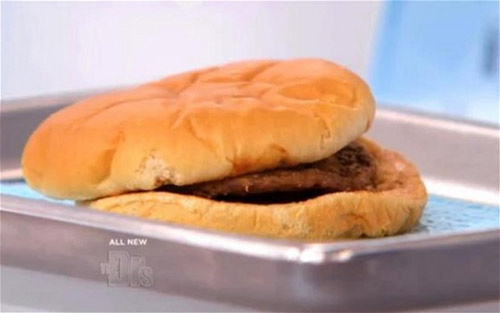|
 David Whipple, a California man, has saved a fast-food hamburger he bought in 1999 for 14 years. |
|
A US man has shown off a 14-year-old McDonald's hamburger that looks the same as the day he bought it. David Whipple, from Utah, had originally planned to keep the burger for two months in order to show friends how its preservatives would maintain its appearance. But, after accidentally leaving the product in his pocket for two years, Mr Whipple decided to keep the burger for even longer to see how long it could continue looking normal. "It wasn't on purpose," Mr Whipple told US television show The Doctors. "I was showing some people how enzymes work and I thought a hamburger would be a good idea. And I used it for a month and then forgot about it. "It ended up in a paper sack in the original sack with the receipt in my coat tossed in the back of my truck and it sat there for, I don't know, two or three months." However, Mr Whipple's experiment was then forgotten after the coat was tossed in a closet. "My wife didn't discover it until at least a year or two after that. And we pulled it out and said 'oh my gosh, I can't believe it looks the same way'." Doctors on the CBS show noted that aside from the pickle disintegrating, the burger showed no signs of mould, fungus or even a strange odour. Mr Whipple admitted that at one point he had considered selling the burger via online auction site eBay. But, despite bids reaching close to $2,000 (£1,300), he and his family decided to keep the product for educational use. He now admits he uses the burger to convince his grandchildren not to eat junk food from restaurants such as McDonalds. "It's great for the grandkids to see. To see what happens with fast food," he said. (Source: Telegraph)
|
一個(gè)美國人近日展示了自己14年前買的一個(gè)麥當(dāng)勞漢堡,這個(gè)漢堡和當(dāng)初他買的時(shí)候一模一樣。 來自美國猶他州的戴維?惠普爾起初打算把漢堡放上兩個(gè)月,目的是到時(shí)候讓朋友們看看防腐劑是如何讓漢堡保持外觀的。 然而,他無意中把漢堡在口袋里放了兩年,于是惠普爾決定把漢堡放得更久一點(diǎn),看它還能維持正常的樣子多久。 惠普爾告訴美國電視節(jié)目《醫(yī)生》說:“我這么做不是故意的。” “我是想讓一些人看看酶是如何發(fā)生作用的,我覺得拿漢堡做實(shí)驗(yàn)是個(gè)好主意。我用漢堡做了一個(gè)月實(shí)驗(yàn),然后就把它忘掉了。 “后來這個(gè)用紙包著的漢堡放在原包裝里,連同收據(jù)一起裝在我的外套兜里,而外套又被扔到我的卡車后廂中,在那里待了——我搞不清了——兩到三個(gè)月吧。” 但是,在外套被扔到一個(gè)櫥柜里后,惠普爾就把他的實(shí)驗(yàn)忘記了。 “直到至少過了一兩年,我的妻子才發(fā)現(xiàn)它。我們把這個(gè)漢堡拽出來,驚嘆道‘天啊,它居然還是老樣子,真讓人不敢相信’。” 哥倫比亞廣播公司的《醫(yī)生》節(jié)目指出,除了泡菜有腐爛跡象外,漢堡上看不到任何霉菌斑,甚至聞不到一絲奇怪的味道。 惠普爾承認(rèn)說,他曾一度想把這個(gè)漢堡通過拍賣網(wǎng)站eBay賣掉。 然而,盡管后來買方出價(jià)高達(dá)近2000美元(合1300英鎊),他和他的家人還是決定把這個(gè)漢堡留作教育用途。 現(xiàn)在他坦言自己用這個(gè)漢堡來說服他的孫兒們不要去吃麥當(dāng)勞這種飯店的垃圾食品。 他說:“讓孫輩們看看這個(gè)很不錯。看看發(fā)生在快餐食品上的奇異景象。” 相關(guān)閱讀 (中國日報(bào)網(wǎng)英語點(diǎn)津 陳丹妮) |
|
Vocabulary: enzyme: 酶 |
